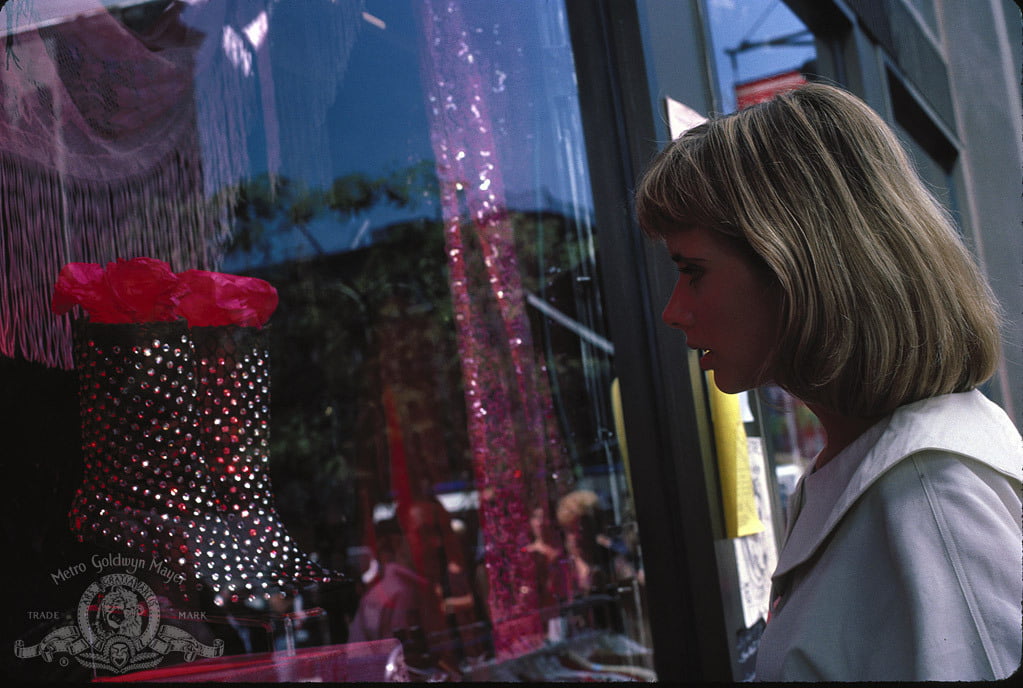On the frustration and fantasy at the heart of ‘Desperately Seeking Susan’
September 11, 2020

Source: IMDb
There have been many films which have focussed on the frustrations of a lonely housewife. The work of director Douglas Sirk for example, explored the repressed emotions and sexuality of American housewives stranded in 1950s American suburbia. There have been other explorations of the topic too, often focussing on the personal and emotional development of the character. But few of them combine that journey of self-discovery with a high-energy crime caper, amnesia, and two women inextricably linked to each other through a curious case of mistaken identity.
‘Desperately Seeking Susan’ (1985), the stylish screwball comedy with a very 1980s aesthetic, was released 35 years ago. Directed by Susan Seidelman, the film stars Rosanna Arquette as Roberta, a bored New Jersey housewife who inadvertently becomes mixed up in a series of adventures due to a knock on the head and a bout of memory loss, which leads her to be mistaken for the free-spirited Susan (Madonna), the woman Roberta, and everyone else, wants to find.
It is a women’s film in many ways. Along with director Seidelman, the lead writer and producer were also female, Leora Barish and Sarah Pillsbury respectively. The story centres on two female characters. It is a film about female fantasy, but the dream is not about finding the perfect man, it is about self-identity, having the confidence to be who you want to be, and taking control of your own destiny.
Roberta Glass is a bored New Jersey housewife. She lives in a financially comfortable suburban bubble. She wants for nothing but craves the one thing she has not got – fulfilment.
But Roberta feels trapped by her circumstances. Her husband Gary (Mark Blum), a social-climbing New Jersey hot tub salesman, barely notices her. But she has only been married for four years and is still young, she is not tied down by the responsibilities of children, so what is to stop her leaving her suburban prison, except perhaps her own insecurities?

Source: IMDb
Lonely and frustrated, Roberta develops a fascination with two strangers, Susan and Jim, who communicate with each other through the newspaper personal ads. Their unconventional love affair gives her a thrill, “Desperate. I love that word, it’s so romantic” says Roberta when she sees Jim’s latest message.
For Roberta, Susan is a means of seeing the world differently. Susan has the sense of independence, confidence, and control over her own life that Roberta craves. The precarious world Susan inhabits seems thrilling to Roberta. There is obsession at play too, as Roberta follows Susan, first through the personals, and then around the city. Watching her every move, assuming each nuance into her own performance later as ‘Susan’. This is the ultimate girl-crush, but her obsession is fuelled by both envy and admiration.
Madonna oozes cool confidence as the almost mythical Susan. She is a free spirit and lives out of a suitcase. Susan answers to nobody. But there is a spark of connection between the two women, and Susan is intrigued by Roberta too. Her remark when reading Roberta’s secret diary that ‘nobody’s life could be this boring’ displays her playful interest in her. Their curious pursuit of each other is one of mutual respect.
There is a more generic love interest in the film, as Roberta builds a connection with Dez (Aidan Quinn). A projectionist in a fleapit cinema, who somehow lives in a stylishly tatty apartment with a view of the Empire State building, he is the total opposite to her uptight husband Gary. He lives the bohemian life Roberta craves, amongst the scruffy romance of Chinatown, with flashing neon sign reflected in puddles, entering buildings via metal fire escapes, surrounded by neighbours who play saxophones at their windows. ‘People live here?’ Roberta cries incredulously when entering Dez’s loft apartment for the first time. This is a New York where all your fantasies can become reality, and you are free to be yourself.

Source: IMDb
Roberta’s knock on the head is both a literal and philosophical one. Being mistaken for Susan by Dez offers her the chance to be a different version of herself. Despite her protestations later that, ‘I’m not who you think I am,’ she grows into her new persona, becoming more self-assured and confident, and finding her sense of self-worth. Trying on the fantasy for size.
Ultimately, Roberta wants to be seen for who she really is and to live the life she craves – whatever that is. Susan is Roberta’s spirit guide to finding the right path to fulfilment, but the film’s ending is ambiguous. We see Roberta with Dez, who perhaps offers the romance her life lacks, and the possibility that the fantasy and freedom of New York life could become her new reality. All we do know is that Roberta is now free to decide what she wants for herself.
Filed under: Film, TV & Tech
Tagged with: anniversary, boredom, Desperately Seeking Susan, female, film, free, housewife, love, madonna, obsession



Comments